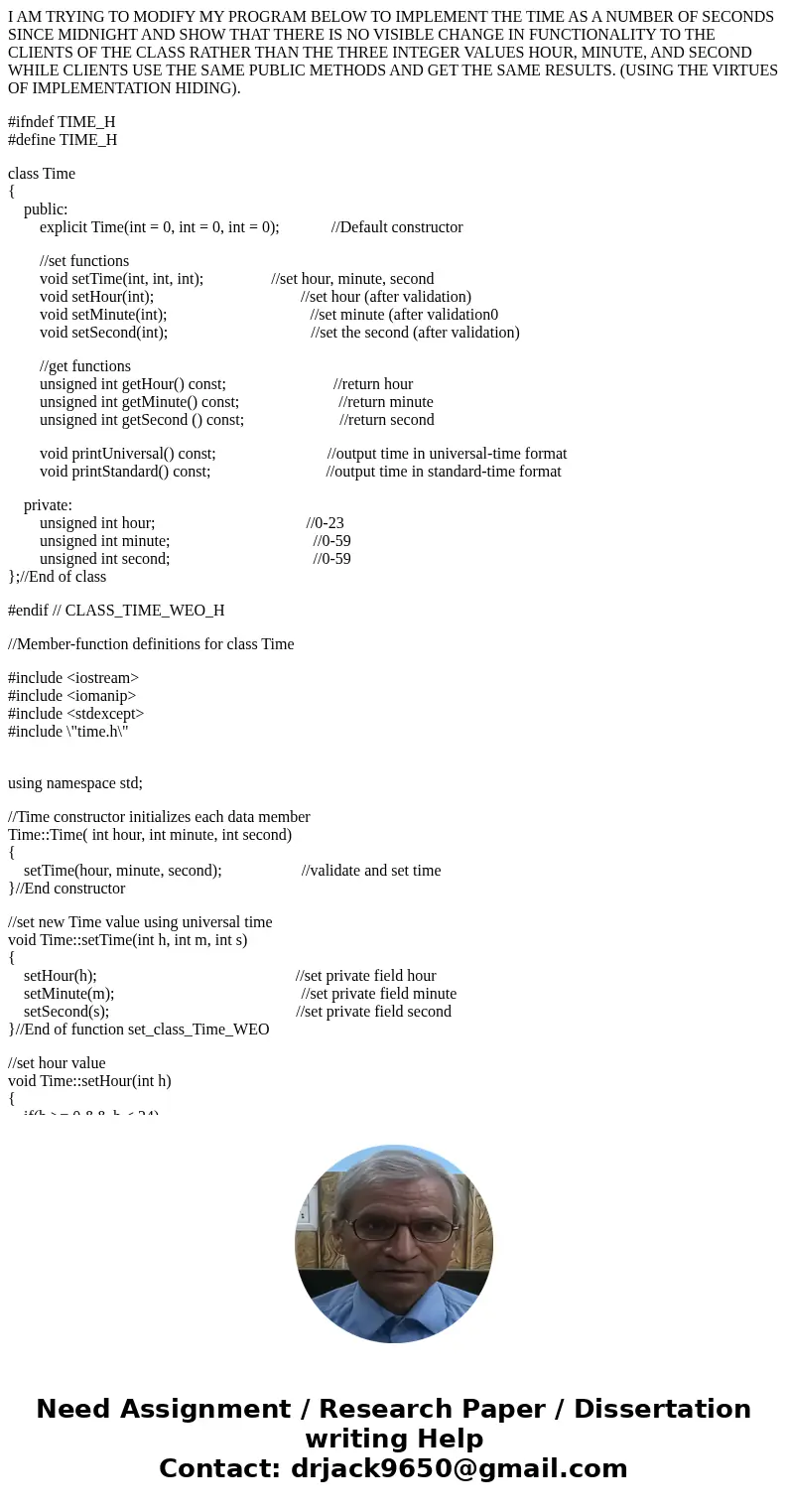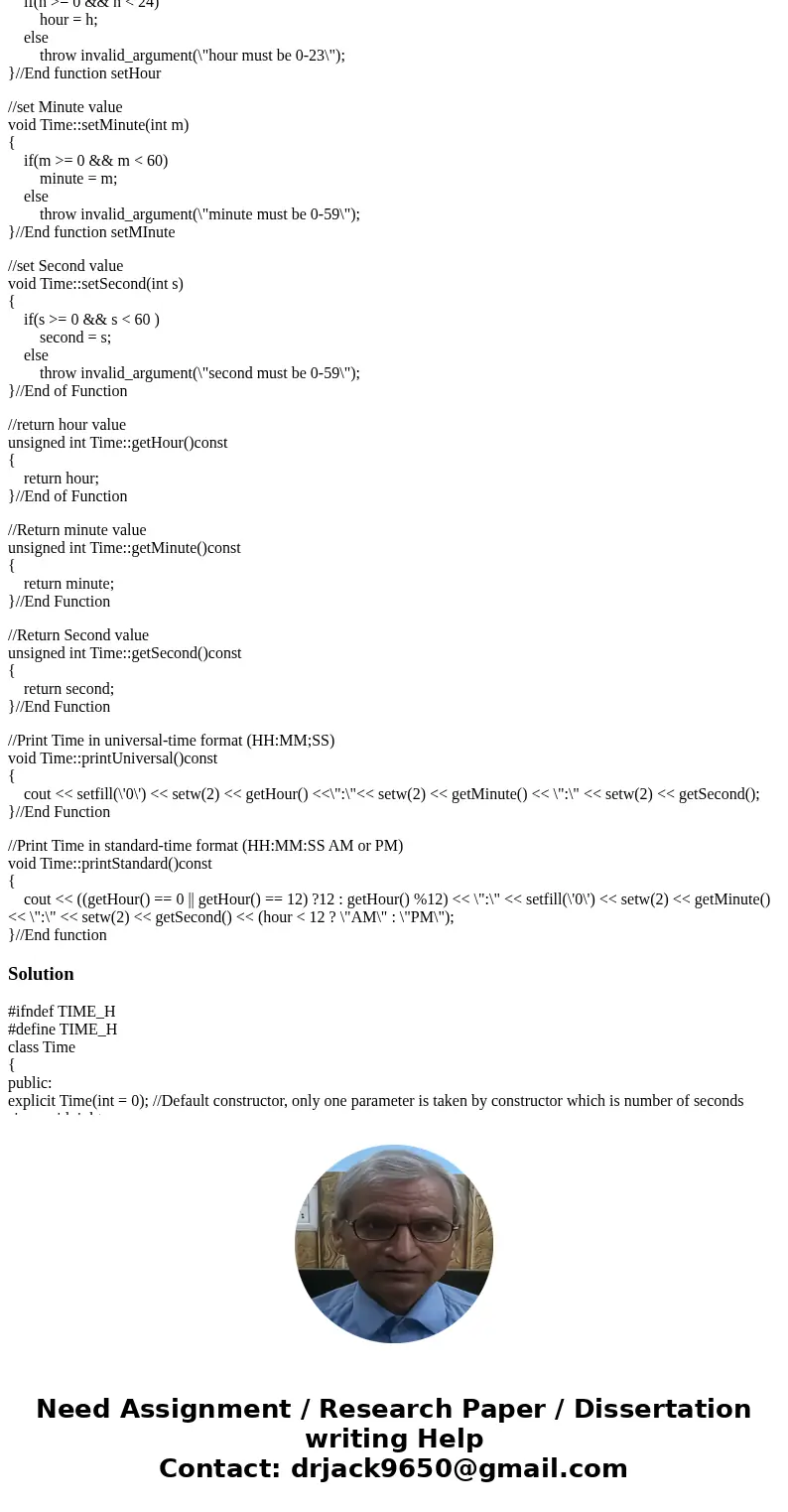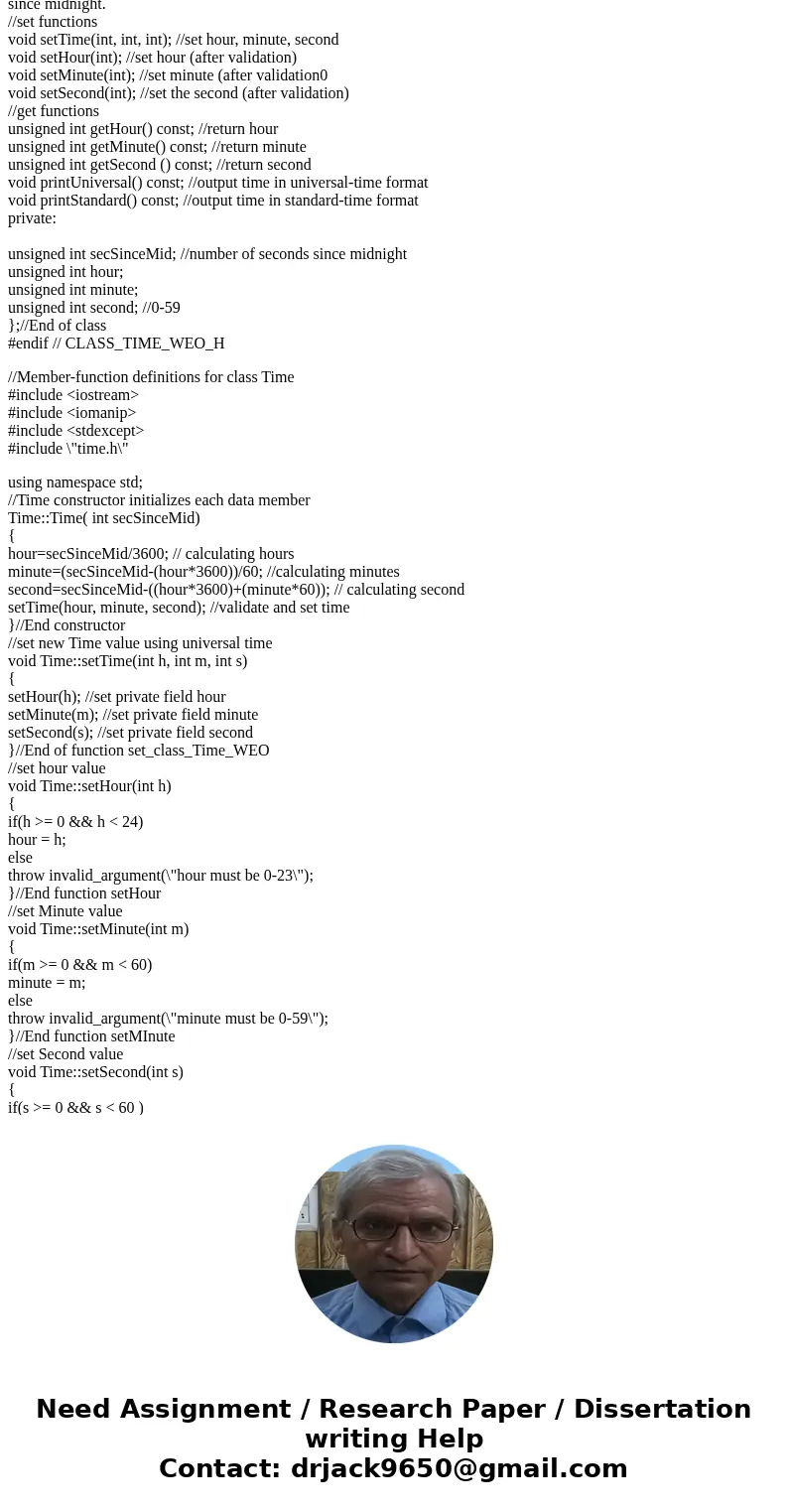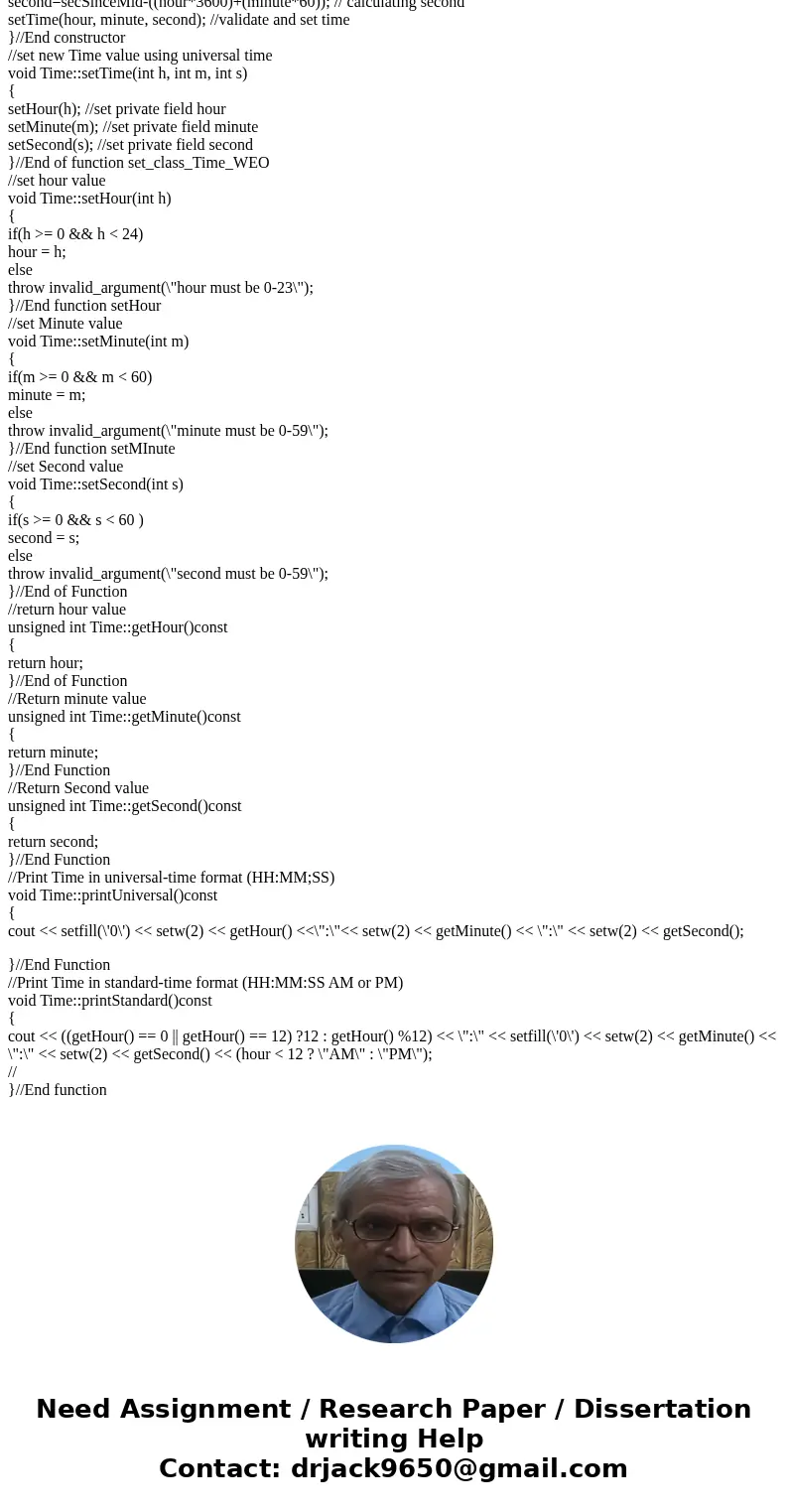I AM TRYING TO MODIFY MY PROGRAM BELOW TO IMPLEMENT THE TIME
I AM TRYING TO MODIFY MY PROGRAM BELOW TO IMPLEMENT THE TIME AS A NUMBER OF SECONDS SINCE MIDNIGHT AND SHOW THAT THERE IS NO VISIBLE CHANGE IN FUNCTIONALITY TO THE CLIENTS OF THE CLASS RATHER THAN THE THREE INTEGER VALUES HOUR, MINUTE, AND SECOND WHILE CLIENTS USE THE SAME PUBLIC METHODS AND GET THE SAME RESULTS. (USING THE VIRTUES OF IMPLEMENTATION HIDING).
#ifndef TIME_H
#define TIME_H
class Time
{
public:
explicit Time(int = 0, int = 0, int = 0); //Default constructor
//set functions
void setTime(int, int, int); //set hour, minute, second
void setHour(int); //set hour (after validation)
void setMinute(int); //set minute (after validation0
void setSecond(int); //set the second (after validation)
//get functions
unsigned int getHour() const; //return hour
unsigned int getMinute() const; //return minute
unsigned int getSecond () const; //return second
void printUniversal() const; //output time in universal-time format
void printStandard() const; //output time in standard-time format
private:
unsigned int hour; //0-23
unsigned int minute; //0-59
unsigned int second; //0-59
};//End of class
#endif // CLASS_TIME_WEO_H
//Member-function definitions for class Time
#include <iostream>
#include <iomanip>
#include <stdexcept>
#include \"time.h\"
using namespace std;
//Time constructor initializes each data member
Time::Time( int hour, int minute, int second)
{
setTime(hour, minute, second); //validate and set time
}//End constructor
//set new Time value using universal time
void Time::setTime(int h, int m, int s)
{
setHour(h); //set private field hour
setMinute(m); //set private field minute
setSecond(s); //set private field second
}//End of function set_class_Time_WEO
//set hour value
void Time::setHour(int h)
{
if(h >= 0 && h < 24)
hour = h;
else
throw invalid_argument(\"hour must be 0-23\");
}//End function setHour
//set Minute value
void Time::setMinute(int m)
{
if(m >= 0 && m < 60)
minute = m;
else
throw invalid_argument(\"minute must be 0-59\");
}//End function setMInute
//set Second value
void Time::setSecond(int s)
{
if(s >= 0 && s < 60 )
second = s;
else
throw invalid_argument(\"second must be 0-59\");
}//End of Function
//return hour value
unsigned int Time::getHour()const
{
return hour;
}//End of Function
//Return minute value
unsigned int Time::getMinute()const
{
return minute;
}//End Function
//Return Second value
unsigned int Time::getSecond()const
{
return second;
}//End Function
//Print Time in universal-time format (HH:MM;SS)
void Time::printUniversal()const
{
cout << setfill(\'0\') << setw(2) << getHour() <<\":\"<< setw(2) << getMinute() << \":\" << setw(2) << getSecond();
}//End Function
//Print Time in standard-time format (HH:MM:SS AM or PM)
void Time::printStandard()const
{
cout << ((getHour() == 0 || getHour() == 12) ?12 : getHour() %12) << \":\" << setfill(\'0\') << setw(2) << getMinute() << \":\" << setw(2) << getSecond() << (hour < 12 ? \"AM\" : \"PM\");
}//End function
Solution
#ifndef TIME_H
#define TIME_H
class Time
{
public:
explicit Time(int = 0); //Default constructor, only one parameter is taken by constructor which is number of seconds since midnight.
//set functions
void setTime(int, int, int); //set hour, minute, second
void setHour(int); //set hour (after validation)
void setMinute(int); //set minute (after validation0
void setSecond(int); //set the second (after validation)
//get functions
unsigned int getHour() const; //return hour
unsigned int getMinute() const; //return minute
unsigned int getSecond () const; //return second
void printUniversal() const; //output time in universal-time format
void printStandard() const; //output time in standard-time format
private:
unsigned int secSinceMid; //number of seconds since midnight
unsigned int hour;
unsigned int minute;
unsigned int second; //0-59
};//End of class
#endif // CLASS_TIME_WEO_H
//Member-function definitions for class Time
#include <iostream>
#include <iomanip>
#include <stdexcept>
#include \"time.h\"
using namespace std;
//Time constructor initializes each data member
Time::Time( int secSinceMid)
{
hour=secSinceMid/3600; // calculating hours
minute=(secSinceMid-(hour*3600))/60; //calculating minutes
second=secSinceMid-((hour*3600)+(minute*60)); // calculating second
setTime(hour, minute, second); //validate and set time
}//End constructor
//set new Time value using universal time
void Time::setTime(int h, int m, int s)
{
setHour(h); //set private field hour
setMinute(m); //set private field minute
setSecond(s); //set private field second
}//End of function set_class_Time_WEO
//set hour value
void Time::setHour(int h)
{
if(h >= 0 && h < 24)
hour = h;
else
throw invalid_argument(\"hour must be 0-23\");
}//End function setHour
//set Minute value
void Time::setMinute(int m)
{
if(m >= 0 && m < 60)
minute = m;
else
throw invalid_argument(\"minute must be 0-59\");
}//End function setMInute
//set Second value
void Time::setSecond(int s)
{
if(s >= 0 && s < 60 )
second = s;
else
throw invalid_argument(\"second must be 0-59\");
}//End of Function
//return hour value
unsigned int Time::getHour()const
{
return hour;
}//End of Function
//Return minute value
unsigned int Time::getMinute()const
{
return minute;
}//End Function
//Return Second value
unsigned int Time::getSecond()const
{
return second;
}//End Function
//Print Time in universal-time format (HH:MM;SS)
void Time::printUniversal()const
{
cout << setfill(\'0\') << setw(2) << getHour() <<\":\"<< setw(2) << getMinute() << \":\" << setw(2) << getSecond();
}//End Function
//Print Time in standard-time format (HH:MM:SS AM or PM)
void Time::printStandard()const
{
cout << ((getHour() == 0 || getHour() == 12) ?12 : getHour() %12) << \":\" << setfill(\'0\') << setw(2) << getMinute() << \":\" << setw(2) << getSecond() << (hour < 12 ? \"AM\" : \"PM\");
//
}//End function




 Homework Sourse
Homework Sourse